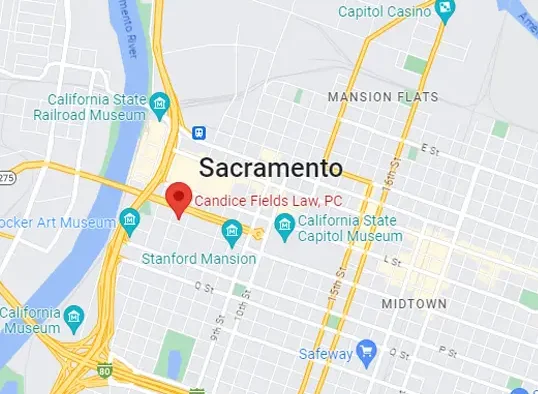Federal Tax Evasion Lawyer
At Candice Fields Law, PC, we have experience defending clients against allegations of tax evasion. Tax evasion, a form of federal tax crime, involves deliberately underpaying taxes owed to the government. These cases require a nuanced understanding of tax laws and the intricacies of the U.S. legal system. Our team brings experience and a keen eye for detail in handling such complex cases. Contact an experienced tax evasion lawyer today.
Need legal assistance?
What Constitutes Federal Tax Evasion?
Federal tax evasion is a serious crime under U.S. law, involving intentionally avoiding paying taxes due to the federal government. Key elements of tax evasion typically include:
Underreporting Income
Underreporting income is a common form of tax evasion. It involves intentionally reporting less income than earned to reduce the tax owed. This can be done in various ways, such as:
- Omitting Income: Not including certain income streams on a tax return, like freelance earnings, rental income, or income from side jobs.
- Falsifying Records: Creating false invoices or receipts to understate income.
- Using Cash to Avoid Reporting: Conducting business transactions in cash and not reporting them.
- Offshore Accounts: Hiding income in foreign accounts to evade detection.
Underreporting income is illegal and can lead to significant legal consequences if discovered by the IRS. The agency uses sophisticated methods to identify discrepancies in income reporting, and those found guilty of underreporting can face penalties, fines, and even imprisonment.
Inflating Deductions
Inflating deductions is another form of tax evasion involving exaggerating allowable deductions on a tax return to reduce taxable income. This can include:
- Overstating Business Expenses: Claiming higher business expenses than were incurred.
- Falsifying Charitable Contributions: Reporting charitable donations that were never made or inflating the amount donated.
- Exaggerating Medical Expenses: Claiming higher medical or dental expenses than what was paid.
- Fabricating Deductions: Creating a false tax return by reporting entirely false expenses or deductions without actual basis.
Inflating deductions is illegal and can lead to severe consequences if uncovered during an IRS audit, including penalties, fines, and potential criminal prosecution. The IRS has measures to detect such discrepancies, and those found guilty could face severe repercussions.
Hiding or Transferring Assets
Hiding or transferring assets to evade taxes involves concealing or moving wealth to avoid tax liabilities. Common methods include:
- Offshore Accounts: Using foreign bank accounts to hide income or assets from tax authorities.
- Transfer to Others: Transferring assets to friends, family, or fictitious entities to conceal ownership.
- Use of Shell Companies: Creating entities without active business operations to disguise asset ownership.
- Investments in Anonymity-Focused Assets: Investing in assets like cryptocurrencies or bearer bonds that offer more anonymity.
These practices are illegal and can lead to serious legal consequences, including fines, penalties, and imprisonment if discovered by tax authorities.
Deceptive Record-Keeping
Deceptive record-keeping in the context of tax evasion involves manipulating financial records to hide true income or financial transactions. Key aspects include:
- Falsifying Documents: False statements like creating or altering invoices, receipts, ledgers, or other financial records to misrepresent income or expenses.
- Omitting Transactions: Deliberately leaving out certain transactions or income sources from financial records.
- Double Books: Maintaining one set of books for official use and another containing the actual financial transactions.
- Inflating Expenses: Recording personal expenses as business expenses or inflating the cost of legitimate business expenses.
Such practices are illegal and aim to mislead tax authorities about an individual's or business's true financial situation, leading to reduced tax liabilities. If uncovered, these actions can result in severe legal repercussions, including fines, penalties, and possible criminal prosecution.
Illegal Activities
Engaging in illegal activities to evade taxes refers to outright unlawful actions specifically designed to avoid tax obligations. This includes:
- Identity Theft: Using someone else's identity or Social Security number to hide income.
- Money Laundering: Channeling illegally obtained money through various transactions or businesses to make it appear legitimate.
- Pyramiding: Withholding taxes from employees but intentionally failing to remit them to the government.
- Illegal Software: Using software that manipulates sales records to underreport income.
These activities not only constitute tax evasion but also involve additional criminal charges. Conviction can lead to severe penalties, including hefty fines and imprisonment.
Criminal Penalties of Federal Tax Evasion

Tax evasion can result in both civil and criminal penalties, depending on the severity of the offense and the circumstances involved. Here are the civil and criminal penalties associated with tax evasion:
Criminal Penalties
- Imprisonment: Tax evasion convictions can lead to prison sentences. The length of the sentence depends on the specific tax laws violated and the amount of tax evaded. Sentences can range from several months to several years.
- Fines: Convicted individuals can face substantial fines in addition to imprisonment. The fines can vary from thousands to millions of dollars, depending on the extent of the evasion.
- Asset Forfeiture: In some cases, the government may seek to seize and forfeit assets, including property and bank accounts, acquired through tax evasion.
- Probation: Instead of or in addition to imprisonment, a court may impose probation, during which the individual must comply with specific conditions, such as regular reporting to a probation officer
Civil Penalties
- Penalties on Underpaid Taxes: Taxpayers who understate their income or overstate deductions may face penalties based on the amount of tax owed. The penalty is typically a percentage of the underpaid tax, and the percentage can vary depending on the severity of the understatement.
- Accuracy-Related Penalties: If the IRS determines that there was negligence or a substantial understatement of income on your tax return, you may face an accuracy-related penalty. This penalty is typically 20% of the underpaid tax.
- Failure to File Penalty: If you fail to file your tax return by the due date (including extensions), you may incur a failure-to-file penalty. This penalty can be as high as 25% of the unpaid tax.
- Failure to Pay Penalty: If you fail to pay your taxes by the due date, you may be subject to a failure-to-pay penalty. This penalty is typically 0.5% of the unpaid monthly tax, up to a maximum of 25%.
- Civil Fraud Penalty: If the IRS determines that you engaged in intentional fraudulent activities to evade taxes, you can face a civil fraud penalty as high as 75% of the underpaid tax.
It's important to note that tax evasion is a serious offense, and the IRS and tax authorities have extensive resources to investigate and prosecute cases. If you suspect you are under investigation for tax evasion, seeking legal counsel immediately to protect your rights and understand your options is crucial. A tax evasion attorney can guide you in navigating the situation and potentially mitigating the penalties you may face.
Signs You Are Under Criminal Investigation for Tax Evasion
Here are some signs that may indicate you are under criminal investigation for tax evasion:
Unusual IRS Communication
Receiving unexpected and frequent Internal Revenue Service (IRS) communication can be a sign. This may include notices, audits, or requests for additional information beyond your usual tax filings.
Inquiries About Your Financial Transactions
If you start receiving inquiries from the IRS or other authorities regarding specific financial transactions or sources of income, it could signal an investigation.
Whistleblower Reports
If someone has reported you to the IRS as a whistleblower, alleging tax evasion, you may become the subject of an investigation.
Changes in Audit Frequency
An increase in the frequency of IRS audits or examinations of your tax returns, especially if you haven't experienced such scrutiny in the past, could be a red flag.
Third-Party Document Requests
Receiving requests from the IRS or other agencies for records and documents related to your financial affairs or business activities may indicate that an investigation is underway.
Witness Interviews
If IRS agents or investigators interview individuals associated with your financial transactions or business operations, it suggests that authorities are looking into your financial activities.
Search Warrants
The issuance of search warrants by law enforcement agencies for your premises or financial records clearly indicates an ongoing investigation.
Unexplained Delays in Refunds
If you notice significant delays in receiving tax refunds or sudden changes in the processing of your returns, it could be due to an investigation.
Informal Inquiries
Casual inquiries from acquaintances, colleagues, or business associates about your tax matters may suggest that word has gotten out about a potential investigation.
It's important to note that some of these signs could have legitimate explanations unrelated to tax evasion. If you suspect you are under investigation for tax evasion, seeking legal counsel immediately to protect your rights and interests is crucial. Consulting with a tax fraud attorney can help you navigate the situation and ensure you are adequately represented during any investigation.
What To Do If You Suspect You're Under Investigation for Tax Evasion
If you suspect you are under investigation for tax evasion, taking immediate and prudent action to safeguard your rights and interests is imperative. Here's what you should consider doing:
Consult with a Tax Evasion Attorney
One of the first and most important steps is to seek legal counsel from an experienced criminal defense attorney who has experience defending against tax evasion charges. Our legal team can provide you with guidance and representation throughout the process.
Maintain Strict Confidentiality
Keep the matter confidential, and do not discuss it with anyone other than our attorneys. This includes refraining from making statements on social media or to friends and colleagues.
Gather Documentation
Collect and organize all relevant financial and tax-related documents, including tax returns, financial statements, receipts, and records of financial transactions. This will be essential for our criminal defense lawyer to assess your situation accurately.
Cooperate with Our Tax Evasion Lawyers
Work closely with our tax evasion lawyers to provide them with all necessary information and cooperate fully in their efforts to represent you. Be honest and forthcoming about your financial affairs.
Do Not Speak to Investigators
If investigators or government agents approach you, politely decline to answer questions and inform them that you will only speak in the presence of our criminal defense attorneys. Do not provide statements, sign documents, or consent to searches without legal advice.
Review Your Tax Returns
With the guidance of our white-collar crime lawyers, review your previous tax returns for any errors or omissions. It's essential to promptly rectify mistakes and voluntarily report any previously undisclosed income or inaccuracies.
Consider Voluntary Disclosure
Depending on the circumstances, our attorneys may advise you to disclose to the IRS or relevant tax authorities voluntarily. This can demonstrate your willingness to cooperate and may result in more lenient penalties.
Assess Your Finances
Evaluate your financial situation and consider securing your assets and financial stability, especially if you anticipate financial penalties or legal fees.
Maintain Records
Continue to keep meticulous records of all financial transactions and communication related to your case. This documentation can be valuable for your defense.
Follow Legal Advice
Adhere to the guidance provided by our tax attorneys at all times. We will help you make informed decisions and navigate the investigation effectively.
Prepare for Possible Outcomes
Be prepared for various outcomes, including negotiation, settlement, or potential litigation. Our tax fraud lawyers will help you understand each scenario's potential consequences and strategies.
Remember that tax evasion investigations can be complex and lengthy, and it's crucial to have professional legal representation from the outset. Our skilled tax evasion lawyers can advocate on your behalf, protect your rights, and work to achieve the best possible resolution for your case.
How Candice Fields Law, PC Can Help

At Candice Fields Law, PC we offer comprehensive assistance for individuals facing tax evasion charges. Here's a closer look at how we can help you:
Experienced Guidance
Our team of seasoned tax law professionals is well-versed in the intricate nuances of tax regulations. We provide you with the knowledge and guidance you need to understand the complexities of tax law and how they apply to your situation. We ensure you are informed and equipped to make informed decisions throughout your case.
Personalized Defense
We understand that no two tax evasion cases are identical. That's why we take a personalized approach to craft a defense strategy tailored specifically to the details of your case. We meticulously analyze the evidence, assess the circumstances, and develop a strategic plan that addresses your unique challenges and opportunities for a favorable outcome.
Representation and Negotiation
Our experienced tax evasion lawyers are your advocates when dealing with tax authorities. We represent you in negotiations with tax authorities, working to achieve the best possible resolution. If the situation escalates to litigation, rest assured that our legal team is well-prepared to fight on your behalf in court. Our goal is to protect your interests and secure a favorable outcome.
Penalty Reduction
Facing tax evasion charges can result in significant penalties and fines. We are committed to diligently working to mitigate these potential consequences. Our team explores every avenue to reduce penalties and fines, ensuring you are not burdened with excessive financial liabilities.
Protecting Your Rights
Your legal rights and reputation are of utmost importance to us. We take proactive measures to safeguard your rights throughout the legal process. Additionally, we aim to minimize any reputational damage resulting from the tax evasion charges. Our comprehensive approach extends beyond the legal aspects to protect your overall well-being.
You can trust Candice Fields Law, PC to provide you with the experience, tailored strategies, and unwavering support you need to navigate the challenges of a tax evasion case. We are dedicated to helping you achieve the best possible outcome while minimizing the impact on your financial and personal life.
Take Action Today
If you have questions about tax evasion, need legal advice, or suspect you may be under investigation, don't wait. Contact us now to protect your rights and explore your options with our experienced tax attorneys. Your financial future depends on it.
Need legal assistance?
FAQs
How is tax evasion different from tax avoidance?
Tax evasion involves illegal activities to evade taxes, while tax avoidance refers to legitimate strategies and actions taken to minimize tax liability within the boundaries of tax laws.
How can I avoid tax evasion charges?
To avoid tax evasion charges, it's essential to accurately report your income and deductions, maintain proper financial records, file your tax returns on time, and comply with tax laws.
Consulting with a tax professional can help ensure compliance.
Can tax evasion result in both civil and criminal penalties?
Yes, tax evasion can result in both civil and criminal penalties. Civil penalties may include fines and interest, while criminal penalties can involve imprisonment, fines, probation, and asset forfeiture.
Is there a statute of limitations on tax evasion charges?
The statute of limitations for tax evasion varies depending on the specific circumstances and jurisdiction. In many cases, it is generally three to six years from the date of the offense. However, it can be extended or tolled in certain situations.
Can I negotiate with the IRS if I've committed tax evasion?
Individuals who have committed tax evasion can sometimes negotiate with the IRS through the voluntary disclosure program. This program may provide an opportunity to come forward, pay back taxes, and potentially reduce penalties.
What are the consequences of a tax evasion conviction on my record?
A tax evasion conviction can have serious consequences, including a criminal record, imprisonment, fines, and damage to your reputation. It may also affect your ability to obtain certain licenses or employment in certain industries.





